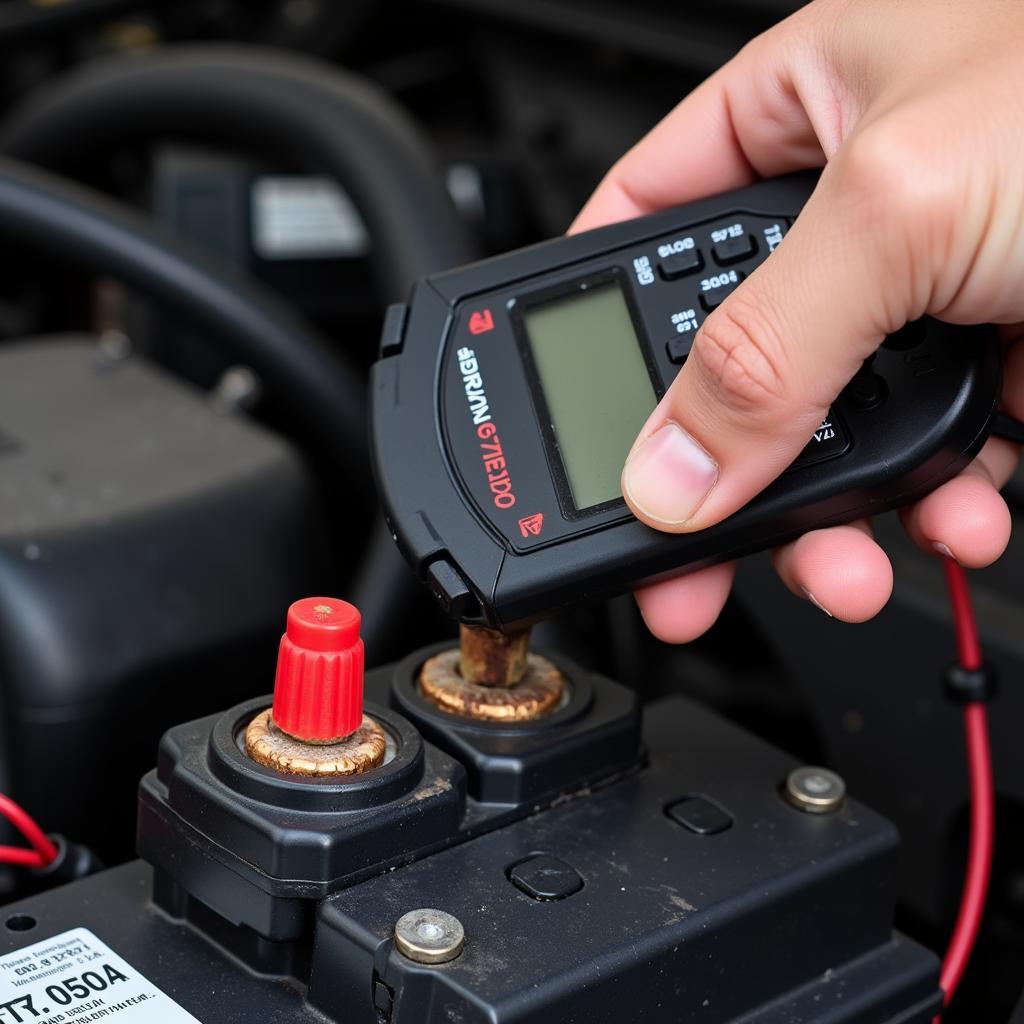A dead battery is frustrating, but what if it’s not completely dead, just sluggish? If your car battery has a bad cell, you’ll experience a range of issues from slow starts to complete failure. This article will delve into the causes, symptoms, and solutions for a car battery with a bad cell, offering guidance on diagnosing and addressing the problem.
Identifying a Bad Cell in Your Car Battery
Several symptoms can indicate a bad cell in your car battery. One of the most noticeable signs is difficulty starting the vehicle. The engine may crank slowly or not at all. You might also notice dim headlights, especially when the engine isn’t running. Other electrical components, like the radio or interior lights, may also function poorly. A distinctive rotten egg smell emanating from the battery is another telltale sign, indicating a leaking or damaged cell. Finally, a visual inspection might reveal bulging or cracked battery casing, a clear indicator of internal problems.
Testing for a Bad Cell
How can you be sure it’s a bad cell? A simple voltmeter can provide some clues. A fully charged car battery should read around 12.6 volts. A significantly lower reading suggests a problem. However, a voltmeter reading alone can’t pinpoint a bad cell. More specialized tools, like a hydrometer or a battery load tester, can provide more definitive results. A hydrometer measures the specific gravity of the electrolyte in each cell, while a load tester checks the battery’s ability to hold a charge under load.
 Testing a Car Battery with a Multimeter
Testing a Car Battery with a Multimeter
What Causes a Bad Battery Cell?
Several factors contribute to a car battery developing a bad cell. Extreme temperatures, both hot and cold, can accelerate the chemical degradation inside the battery. Overcharging or undercharging can also damage the cells. A faulty charging system in the vehicle can lead to these charging imbalances. Sulfation, the buildup of lead sulfate crystals on the battery plates, is another common culprit. Sulfation occurs when the battery is left discharged for extended periods. Finally, physical damage to the battery, such as vibrations or impacts, can also cause internal cell damage.
Preventing Bad Battery Cells
Preventing a bad cell is often easier than dealing with the consequences. Regularly checking your battery’s voltage and ensuring your vehicle’s charging system functions correctly are crucial preventative measures. Keeping the battery clean and free of corrosion can also help prolong its lifespan. In extreme temperatures, consider using a battery heater or cooler to protect the battery from temperature extremes.
Solutions for a Bad Cell
Unfortunately, a car battery with a bad cell cannot be repaired. Replacement is the only viable solution. When replacing your battery, ensure you choose the correct type and size for your vehicle. Consult your owner’s manual or a qualified mechanic to determine the appropriate specifications.
Replacing the Battery
Replacing a car battery is a relatively straightforward process, but some safety precautions are essential. Always disconnect the negative terminal first, followed by the positive terminal. When installing the new battery, connect the positive terminal first, then the negative. Ensure the battery is securely fastened in place. After installation, verify that all electrical components are functioning correctly.
Conclusion
A car battery with a bad cell can lead to a host of problems, from inconvenient starting issues to complete vehicle failure. By understanding the causes, symptoms, and solutions, you can effectively diagnose and address this issue. Remember, regular maintenance and prompt replacement are key to avoiding the frustrations of a failing car battery. Don’t let a bad cell leave you stranded.
FAQs
- Can a car battery with a bad cell be recharged? No, a bad cell is a permanent failure. Recharging will not fix the underlying problem.
- How long does a car battery last? Typically, car batteries last between 3 and 5 years, but various factors can influence lifespan.
- What is the cost of a new car battery? The price varies depending on the type and size of the battery, but expect to pay between $50 and $200.
- Can I jump-start a car with a bad battery cell? While jump-starting might temporarily get your car running, it’s not a long-term solution.
- How do I dispose of an old car battery? Most auto parts stores and recycling centers accept old car batteries for proper disposal.
- What is the warranty on a new car battery? Most new car batteries come with a warranty, typically ranging from 1 to 3 years.
- Can a bad alternator cause a bad battery cell? A faulty alternator can overcharge or undercharge the battery, contributing to cell damage.
